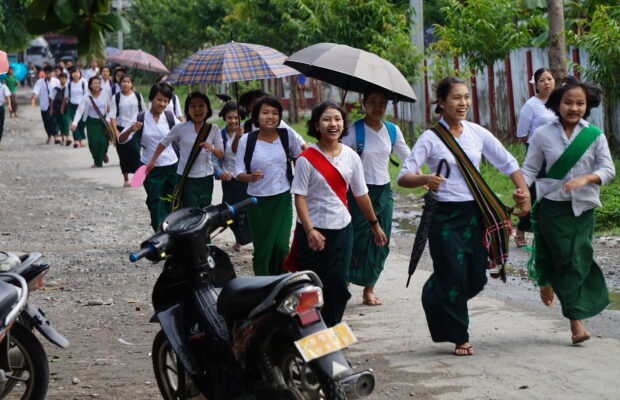Clandestine life at the Myanmar border
The new anti-migration policy in Thailand and the civil war in Myanmar have thrown the border area into turmoil. Faced with the horror from […]
In Thailand, the new anti-migration policy has brought turmoil to the border area with Myanmar. Where trade was common and accepted by all, the civil war has changed everything. Faced with the horrors of persecutions and bombings on the Burmese side, live is giving way to survival.
Text and pictures : Antoine BESSON
From the riverbanks, an enchanting picture of life and quietness emerges, far from the conventional representations of a border. In the Tak province, the Moei River is a peaceful stream, flowing towards the Salween basin to the north, where it runs into the river by the same name, separating at random the land and people of Myanmar and Thailand.
A few women wearing Tanakan, a traditional Burmese cosmetic, on their face with basins perched on their heads are carrying the day’s laundry. A little further, men are fishing and children are swimming or trying to catch shellfish. In the sunset rays, boats glide on water and children’s laughter echoes behind barbed wire. It’s easy to forget that these everyday scenes take place on a border patrolled everyday by armed soldiers, and that just a little further away, war is killing thousands of innocent people.
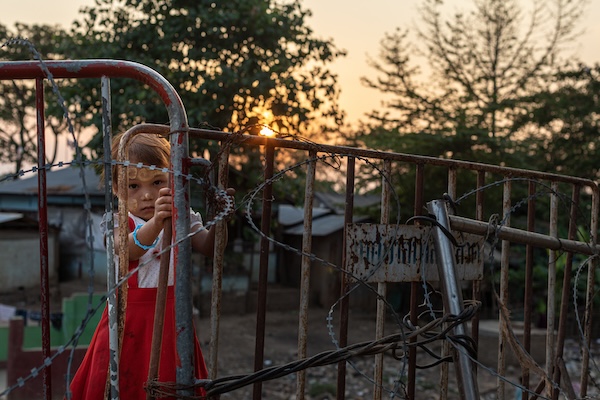
On the Thai side, in a small village close to the border, Kabi, 42, is seating in front of a few wooden houses. The April sun shines its burning rays on the metal roofs. Originally from Pathein, near the Irrawaddy, Kabi arrived in Thailand 5 years ago, before the war. “Freedom, work, life: everything is better here!”
Father of two children, head of a small Burmese community of around thirty families, he is a strong day laborer but looks to the future with concern. He has recently received news from his village: “The military has invaded and are forcing men to enlist. Those who refuse to become soldiers have fled and are on their way to Thailand.” Kabi knows he will have to face a new wave of illegal migrants, find a place for each of these desperate brothers, find a job for them and a place in school for the children.
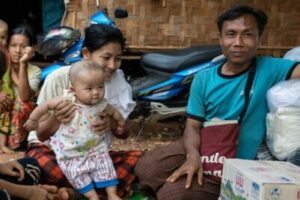
Since February 1st, 2021, Myanmar as been going through a civil war like none before, sparked by the refusal of the vast majority of the population to approve the coup d’état perpetrated by the military following parliamentary elections in which the outcome was particularly unfavorable to them. Initially peaceful, the protest turned into a guerrilla war involving both ethnic militias and groups of armed citizens self-proclaimed as the “People’s Defense Forces”. Faced with this unprecedented resistance, the professional army, which is facing difficulties on the ground, is increasingly dependent on its air supremacy. In 2022, it is believed they have launched bombs more than 670 times, compared to 70 in 2021, sometimes deliberately targeting villages, concerts or even schools. In Myanmar, death comes from the sky without distinction between combatants and civilians.
“Every night we hear the echoes of bombings and fighting”.
There are already more than 1.4 million internally displaced people and refugees fleeing the massacres. “The Thai border is a natural refuge for us; it is much easier to cross than the border with Bangladesh”, says Kabi. Above all, Thailand has historically been a land of asylum for Burmese refugees, particularly the Karen, whose state borders the Land of Smiles. Thirteen camps on the border, with a total population of around 100,000, bear witness to this shared past.
On the road to Umphiang, the mountain smells of earth and hot sap. The scent of wild jasmine mingles with the acrid smell of smoke from the slash-and-burn sites. Umphiang is one of these refugee camps. Thai soldiers guard access to the road, and the lives of those who fled war and poverty 30 years ago are divided between idle confinement and working in the fields during the season, when they are granted a rare dispensation.
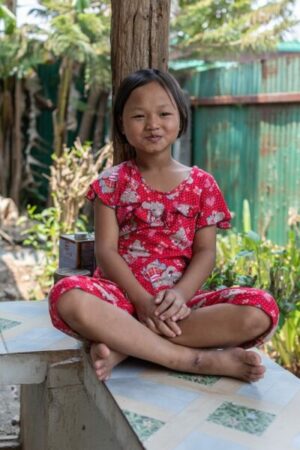
Hired on the fertile fields nearby, they work the land that will never be theirs. In Thailand, refugees without a residence permit can neither study in Thai schools nor travel within the country. “In the camps, refugees are dehumanized because everything that makes them human is taken away from them: their freedom of movement, their freedom to work, their freedom to decide for themselves. Camps only postpone the refugee’s problems, only education is a long-term solution” explains Lah Shee, program director of the Burmese Migrant Workers’ Education Committee (BMWEC). In the current crisis, these outdated camps are no longer accepting new refugees and, since the 2014 coup, Thailand’s military-led government has been trying to implement a new policy of drastically controlling migration.
“Camps only postpone the refugee’s problems, only education is a long-term solution”
The border between Thailand and Myanmar runs the length of the country. In the South, in the Phuket region, many illegal migrants are looking for work. Their living conditions are often very poor, like this house built on a rubbish dumpsite.
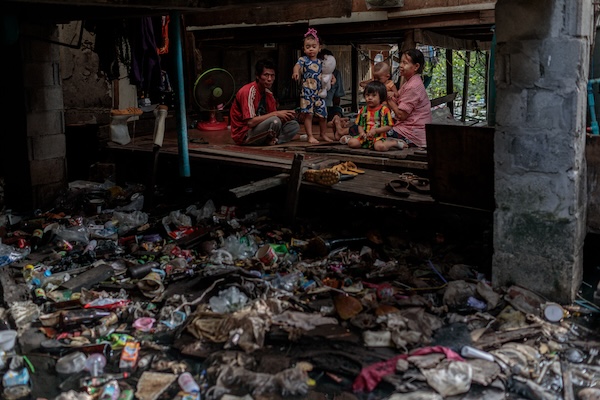
A few kilometers from the camp, in Pawai, in an illegal village of two hundred, mostly children, new migrants are arriving en masse. The camps being closed, illegal immigration outside of any structure is the new norm for escaping the civil war. Taking advantage of the global sanitary situation, Thai authorities have banned the entry of any refugees other than those coming on a short term basis. The army patrols the borders, intercepting and detaining people who cross them. Authorized to take shelter for a few hours or a few days, the families are sent back as soon as the shooting or bombing stops. So they have to be cunning and discreet, and avoid the crowds, to find refuge in Thailand.
To Mei is one of these illegal refugees living in the village of Pawai. He watches sadly as the horde of soiled faces passes him by. “We have not had any water to wash ourselves for several days now”, he says laconically. At the height of the hot season, these living quarters built by an illegal population must cope with complex health issues and a constant influx of new refugees.
Amongst them, more and more children. This is the instinct of many parents, trying to keep their children safe while they stay in the village to work the land or fight against the army. “It is also a deliberate choice for education,” adds a local teacher who prefers to remain anonymous. Thai schools have a good reputation in Myanmar, not to mention the fact that since the coup, the Burmese school system has completely collapsed, and many teachers and parents are deserting the official system in protest”. It is estimated that 40% of the school-age population in Myanmar has dropped out.
On the other side of the border, the situation is no better: “There are new unofficial rules circulating in Tak province: Thai school headmasters are encouraged not to take undocumented pupils or to limit the number of pupils in their classes. But it has to be said that most Thais are sensitive to the plight of refugees, especially children. They help as long as people do not find out about it”.
In response to these needs, another type of school has been created: the learning centers, structures that are mostly based on the desire of one or more teachers not to leave migrant children without an education. These schools, which vary greatly in size, provide a basic education. Si Li Taune has 126 pupils in a school set up in a rudimentary house. At 35, this young woman has taken up the project created by her father: “The most important thing is to ensure continuity in schooling so that these years are not lost”. There are other, larger structures supported by institutions and associations funded by the Burmese diaspora, such as the Hsa Thoo Lei foundation, which takes in more than 1,000 migrant pupils in Mae Sot, 84 of whom are housed in boarding schools.
Kyaw Kwy Sue is 16 years old and has kept his baby face, yet his story is the same as that of hundreds of children who are pushed too quickly onto the path of adulthood by war. Kyaw Kwy Sue fled his home village where the ethnic militia wanted to forcibly recruit him as a child soldier: “I do not want to become a soldier because I do not want to kill”, he explains.
Along with four other young people from his village, he came to Thailand in search of anonymity and safety but was unable to find a place in a boarding school. In the end it was a former Burmese refugee, now a naturalized Thai citizen, who took him in: Eh Thoo.
Eh Thoo is the very symbol of the incredible solidarity that unites Burmese refugees and of the unsuspected resources they can bring to help each other. A surrogate mother to 52 children without a legal status in Thailand, this teacher explains her incredible dedication by her personal story: “I come from nowhere, from no village, because my mother who brought me up alone never stopped moving to escape the fighting. So I understand the distress of these children!” Tears stream down the kind face of this discreet woman at the mention of these childhood memories. Entirely devoted to the cause of the children in her care, she justifies her courage and determination with a simple phrase that sounds like a motto for someone who has already had too much contact with death: “Life is too short!”
Life is too short
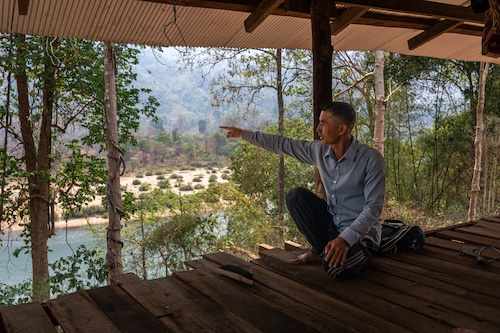
You might think that a person like Eh Thoo would not be commonplace. In truth, these profiles do not seek to draw the spotlight on themselves. And yet, in these times of crisis, many of them are trying to help children who are victims of this unjust war. For example, Di Thoo, a robust 45-year-old, travels up the Moei River to his school in Myanmar, which he sets up in 2018. The son of a father from the Mon ethnic group, he returned to Myanmar after six years in the United-States because he could not get used to life in the city: “Here, life is easier and of a much higher quality”.
He soon discovered that there were too many uneducated children roaming the villages and jungles. So he opened a school for 207 children 20 kilometers from the border, in the north of Karen State. The aim was to provide professional training, but the war turned everything upside down: “Every evening, we hear the echoes of bombing and fighting. A month ago, a bomb fell near the school.”
The pupils come from all over the jungle where many villages have been destroyed. It is the case of 17-year-old Naw Nie Nie Hoo, whose village was bombed and turned into a base for the army located over 200 kilometers away. Di Thoo’s latest project to bring these children to safety has been to buy land in Thailand, on the other side of the border, to give the schoolchildren a place to fall back to in the event of bombing. “Today, my priority is safety, saving the lives of these children and preparing their future through education. Food comes second, it’s a matter of survival!”
Survival is what it is all about for the thousands of illegal refugees in Thailand. Everywhere, faces close at the mere mention of the future. The war and the horror are too close for them to dream of the future. In this despaired context, a brave few dare to hold up school and knowledge as the only beacons of hope.
My priority is the safety of these children and preparing their future through education.
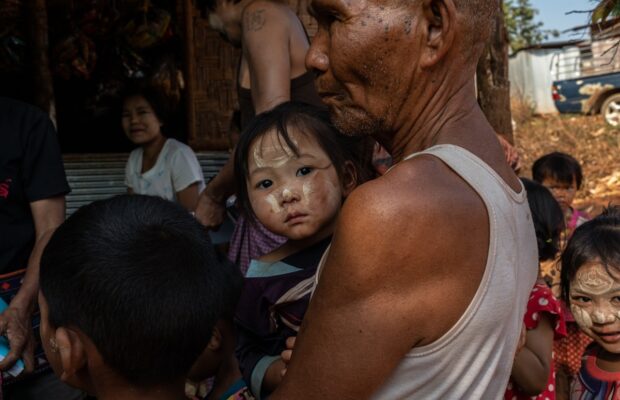
The new anti-migration policy in Thailand and the civil war in Myanmar have thrown the border area into turmoil. Faced with the horror from […]
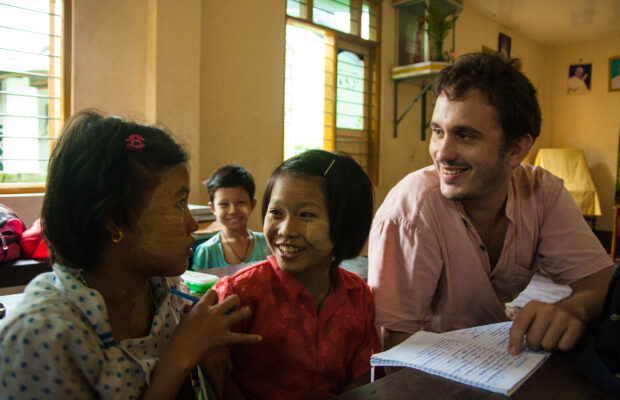
Author: Shi Xian Conflict aftermath in Myanmar poses extensive barriers to quality education for refugee girls, disrupting access due to fleeing families and limited […]
